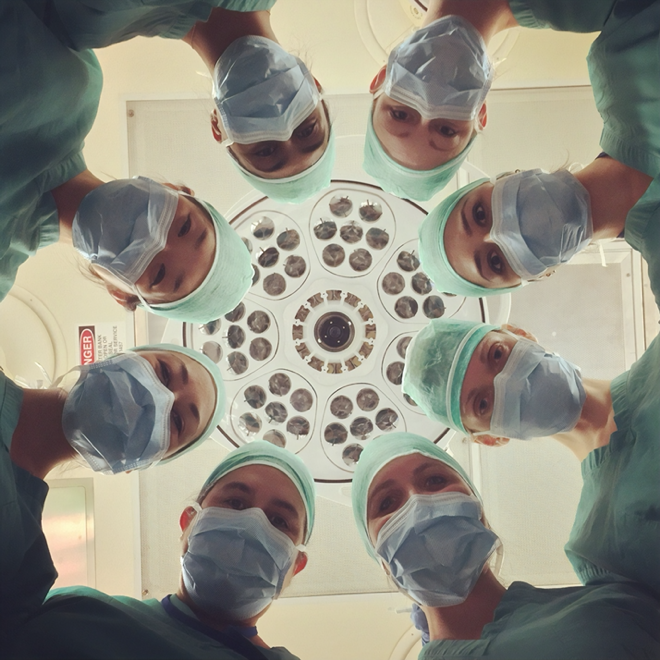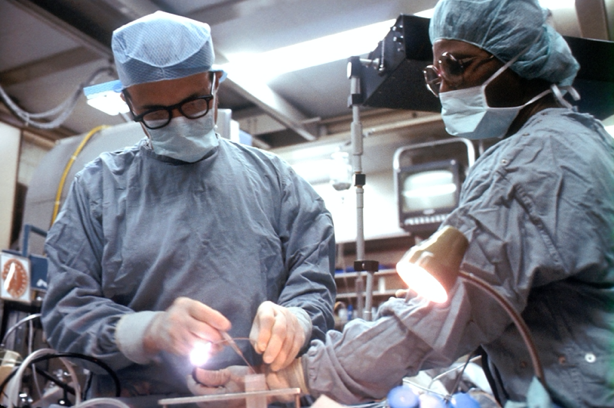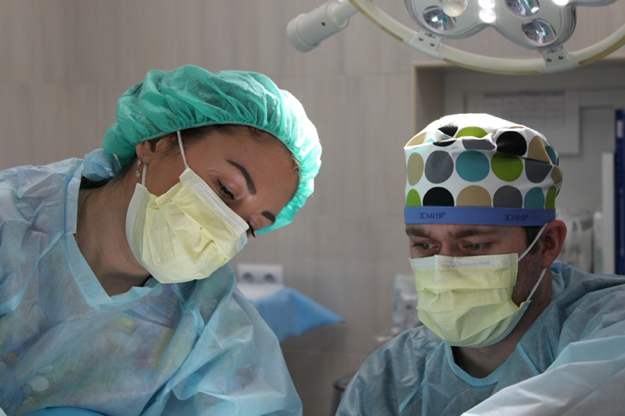CALL TODAY 646-846-1136 | EMAIL
Surgical Experts Dedicated to Improving Lives
At Lenox Hill Surgeons, our dedicated team of nyc surgeons and medical professionals provide compassionate care with the highest ethical & professional standards. In our state of the art facility, we offer surgical services using only the most cutting edge and current procedures and treatments.We specialize in general surgery, including extensive experience in performing hernia repair surgery. Our expertise is in minimally invasive surgery and robotic surgery. Minimally invasive and robotic surgery often allow patients to experience easier recovery than traditional open surgery. They also allow for more precise and less traumatic surgery. When robotic and minimally invasive surgery is not an option, we are also skilled and experienced in traditional open surgical procedures.
All of our doctors are experienced and skilled surgeons having undergone extensive training in school, residency and fellowships. They all practice medicine with ethical behavior, compassion and superb bedside manner. In the operating room they all exhibit precise mechanical abilities, analytical thinking and the ability to visualize tissue in three dimensions. These innate and learned skills allow our surgeons to be some of the most dexterous and skilled professionals in all of New York City and the Country.
Call us: 646-846-1136
About The Surgeons
PATIENT TESTIMONIALS
Recent Awards
We are honored and deeply appreciative to have consistently received prestigious awards and recognition year after year, establishing us as one of New York’s foremost hospitals for a wide range of general surgeries, safety measures, specialized procedures, and overall excellence in healthcare. At Lenox Hill Surgeons, our unwavering commitment lies in delivering exceptional care and unwavering support to our patients, guaranteeing their safety and successful recovery throughout their entire surgical experience.
Hospital Quality Awards
 America’s 50 Best Hospitals Award™ (2023, 2022)
America’s 50 Best Hospitals Award™ (2023, 2022)
Top 1% in the nation for providing the highest clinical quality year over year.

America’s 100 Best Hospitals Award™ (2021)
Top 2% in the nation for consistently delivering clinical quality year over year.

America’s 250 Best Hospitals Award™ (2023, 2022, 2021)
Top 5% in the nation for consistently delivering clinical quality.

Patient Safety Excellence Award™ (2023, 2022)
Top in the nation for providing excellence in patient safety by preventing infections, medical errors, and other preventable complications.
Specialty Clinical Quality Awards

America’s 100 Best Hospitals for Cardiac Care Award™ (2023, 2022, 2021, 2020, 2019)
Superior clinical outcomes in heart bypass surgery, coronary interventional procedures, heart attack treatment, heart failure treatment, and heart valve surgery.

America’s 100 Best Hospitals for Coronary Intervention Award™ (2023, 2022, 2021, 2020, 2019)
Superior clinical outcomes in coronary intervention procedures (angioplasty with stent).

America’s 100 Best Hospitals for Prostate Surgery Award™ (2023, 2022, 2021)
Superior clinical outcomes in prostate removal surgery and transurethral resection of the prostate.
Click to see all of our Healthgrades best doctors awards


Visit our main website at www.LenoxHillSurgeons.com
Blog Posts are Below:
Monthly Archives: June 2021
General Surgery: Colon Cancer
People with colon cancer mostly have to undergo general surgery. It is the primary treatment for people with early stages of colon cancer. Furthermore, there are different types of colon surgeries. The doctors choose to perform between each of the surgery by considering certain factors. These factors involve the severity of cancer, location of the abnormal growth in the colon, and the exact purpose of the surgery.
Polypectomy
Surgeons use this type of colon surgery procedure for patients that are just in the early stages of tumor. In this stage, polyps start to spear in the colon. These polyps are small abnormal growth in the colon that share the size of a mushroom. In hindsight, they look like small bumps or dents in the colon.
Since polyps do not cause sizable disruption, a doctor can simply use a colonoscopy tube to get rid of them. A polypectomy is a procedure in which the doctor inserts a long tube inside a patient and attaches a camera to it. The camera helps the doctor navigate around the colon to look for cancerous polyps.
After the careful spotting of the polyp, the doctor uses a wire to loop around the stem of the polyp and then cut it off with the help of an electric current. This a very careful procedure; the doctor takes plenty of precautions before they can remove the cancerous cavity. Nevertheless, it is relatively easier and less time consuming than other surgeries for colon cancer.
Local Excision
Local excision is another minimally invasive procedure like polypectomy. For procedures such as these, the doctor does not have to make incisions in the stomach. However, this procedure requires slightly more involvement from the professional. The doctor not only removes the cancerous polyps inside the colon but also the surrounding healthy tissues.
This prevents further spread. However, this does not promise the prevention of further growth of cancerous cells. If the doctor believes that the cancer is likely to spread, then they will opt for another procedure, such as Colectomy.
Colectomy
Colectomy is one of the solutions to treat colon cancer. The doctor removes the colon or some parts of the colon in this surgery. The doctor decides whether they will perform a total colectomy or partial colectomy depending on the intensity of the abnormal growth.
Partial Colectomy
In a partial colectomy, surgeons remove one-third or one-fourth of the colon along with some of the lymph nodes so they can check them for cancer. This surgery only removes the portion of the colon that has cancerous growth and then sews the remaining colon together. You can also call this surgery segmental colectomy and hemicolectomy.
Total Colectomy
In a total colectomy, a person undergoes a complete colon removal. The doctor goes for this option when the polyp growth extends beyond control. Furthermore, doctors may also resort to this solution when the person with colon cancer starts having other problems with their colon.
Colostomy
If the doctor is unable to instantly sew the colon together after partial colectomy, then the patient undergoes a colostomy. For this surgery, the doctor attaches a colostomy bag to the colon until the other part of the colon heals. The plastic bag allows the patient to pass stool from the colon since the bag acts as a collective source of the stool. The bag directly attaches to the stoma of the colon; the stoma is the opening of the operated colon.
Colectomy – The Procedure
There are two ways a doctor can perform a colectomy: Open colectomy and laparoscopic-assisted colectomy.
Open Colectomy
For this procedure, the doctor makes a long incision in the abdominal region of the body. Surgeons use a scalpel for this surgery, and it creates an opening into the colon for operation.
Laparoscopic Assisted Colectomy
Unlike open surgery, the surgeons make multiple small incisions and use a laparoscope, along with other tools to perform this operation. The laparoscope is a long and thin tube, having a micro camera and lights at the end of it. This allows surgeons to move around the abdomen with the help of this tool and have clear visibility. In comparison to open colectomy, this procedure is less invasive.
Since the incisions in this procedure are small, the patient recovery time decreases to a significant amount. Thus, a patient does not have to be under bed rest for too long in this surgery. Nevertheless, this is a much more technical procedure because of the use of highly advanced tools. Only surgeons that have the expertise and experience of performing a laparoscopic surgery will offer you the best procedure.
General Surgery Colon Cancer: Consult with Experienced Surgeons
If you want access to professional and expert colon surgery in New York, then head on to Lenox Hill Surgeons. We offer the best surgical services, along with the expertise of surgeons that specialize in colon surgery. Visit our website now, or call us at 646-846-1136 to book an appointment.
Do you Think you May Have a Hernia?
Do you think you may have a hernia? Read on to learn all about what hernias are and how they are caused. Many people classify Hernias into different kinds, Inguinal, Femoral, Incisional, and Umbilical. However, few understand the exact occurrence of the Hernia. You will find most of the hernia occurrences in the abdominal regions of the body. That said, a hernia can also make an appearance in the thighs and groin areas as well. Although most of the hernia conditions are not life-threatening, some can send patients into intensive care.
What is a Hernia?
A Hernia-induced pain is a pressure exerted by an internal organ on the tissue walls that are holding it. Organs tend to show protuberance around muscle linings, and this causes a person to feel intense pressure. If the hernia is abdominal, you may feel intense pain in the stomach, and depending on the severity, you may also need intensive care.
Since a hernia usually causes an organ to put pressure on the tissue or muscle, you can also notice an outward bulge on the stomach area in the case of an abdominal Hernia. Thus, a physician may simply look for an outward bulge for the diagnosis of a hernia.
The most obvious cause of a hernia is the weakening of a muscular wall that is keeping a specific organ in place. When a specific muscular wall is unable to withstand the pressure of an organ, then the organ pushes the wall, causing a lump. This bulging lump may diminish after wishful waiting and lying down. Furthermore, it can also make an appearance after intense coughing.
Common Causes of a Hernia
Ultimately, the only reason an organ will cause a muscle to bend is when a certain muscle is weak. Therefore, weak muscle linings and tissue is the sole cause of a hernia. The weakened spot on the tissue is a birth defect in some cases, while it can also be a cause of certain activities later on in life. Excessively performing any movement that imposes pressure on internal muscle organs is likely to cause a hernia over a long period. The following are some of the activities.
- Straining your abdominal muscles while defecating in the toilet (People who have a bad case of constipation are vulnerable to hernia as well)
- Excessive coughing (Dry coughs usually cause your abdominal muscles to tighten. Thus, repetitive coughing episodes put unnecessary strain on the stomach)
- Persistent sneezing
- Obesity
- Smoking (Smoking causes excessive coughing, and long term smoking can also potentially cause internal damage to abdominal muscles)
- Heavy Lifting (you can run the risk of a hernia when you lift a heavy object from the ground without stabilizing your abdominal core. You must always engage your core before you lift a heavy object from the ground to avoid excessive strain on your muscles.)
- Physical Exertion
Symptoms
In most instances, a hernia will cause a swelling in the particular region. In this circumstance, the hernia poses no immediate danger, and resting will cause it to diminish over time. Other symptoms of acute hernia such as this include pain, discomfort, and excessive strain while walking.
However, some cases are more severe and can lead to other symptoms such as nausea, vomiting, and even blood in the stool. In these cases, a person needs immediate surgery for the herniated area. In the case of a Hiatal Hernia, the swelling is not present on the surface. The person experiences symptoms such as heartburn, indigestion, chest pain, and difficulty swallowing.
Furthermore, you can also push the hernia-induced lump or bulge back in the stomach. Most people opt for lying straight down to flatten the lump. It also helps to avoid activities that can trigger a bulgy reaction on the stomach. These activities include laughing, coughing, crying, or any other form of physical exertion.
Prevention
If you want to minimize your risk of a hernia, then it is ideal that you maintain your body weight. Regular exercises and a healthy diet result in the strengthening of muscles. Moreover, you can also train your abdominal muscles to withstand an excessive amount of pressure.
Besides training and exercising, you also have to make sure that you avoid lifting heavy objects. Even if you want to lift heavy weights, make sure that you go through proper training, warm-up, and technical insight over core engagement.
Additionally, you must take care of your nutrition. Avoid meals that evoke constipation and stomach issues. Make sure that your meals involve adequate micronutrients and fiber so that you can pass stool smoothly, without complications.
Lastly, avoid the habit of smoking. Smoking is not just harmful to your lungs but also causes persistent coughing and sneezing. This ultimately can result in a hernia if you do not treat it soon enough. Make sure that you visit the doctor in the case of coughs.
Do You Have a Hernia? Consult a Top Surgeon
If you feel like you have a hernia, make a quick self-diagnosis and do not prolong the symptoms. Seek professional help immediately. Waiting on a hernia can make the situation worse; the earlier the treatment, the better. Lenox Hill Surgeons provide the best Hernia treatment, diagnosis, and services in New York. Contact them at 646-846-1136 to book an appointment now.






















